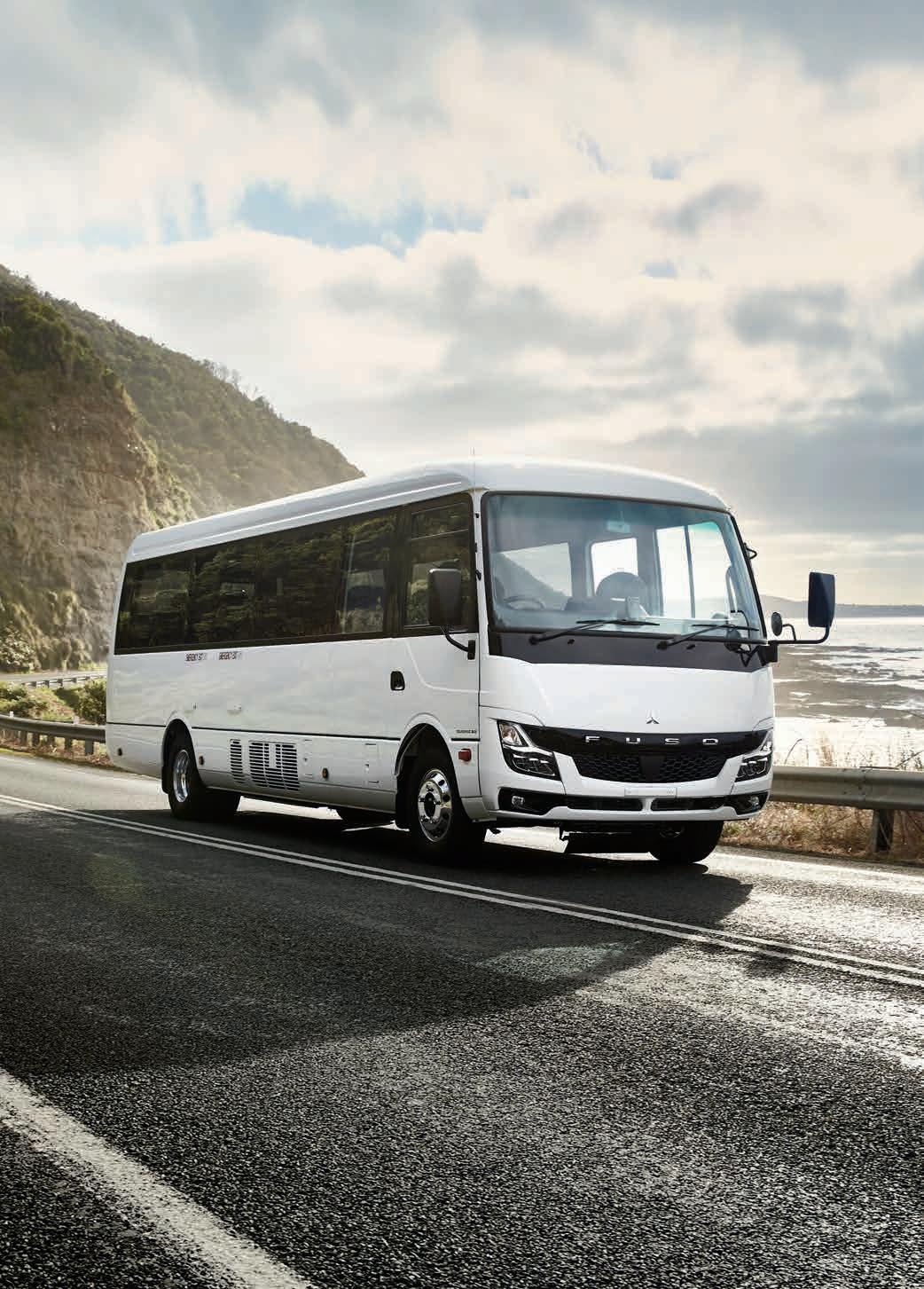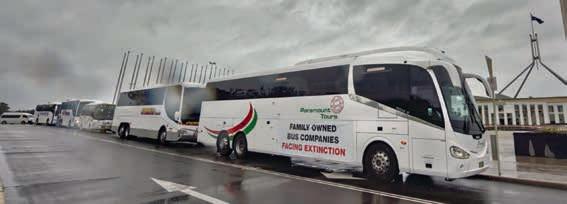
6 minute read
In focus | canberra bus rally
‘MUM AND DAD’ BUS BUSINESSES STAGE CANBERRA RALLY
A 15-strong convoy of family owned ‘mum and dad’ bus companies from across Australia made its way to rally outside Parliament House, Canberra, on October 26 to highlight the economic pressures these small businesses are under.
To highlight their plight, the 15 ‘desperate’ small bus-company owners in their buses joined a convoy that circled the lawn in front of the Parliament building in a display of solidarity – organised by Australian Family Owned Bus Companies.
The buses joined the convoy after meeting with shadow tourism minister Senator Don Farrell and Labor MPs Susan Templeman (Macquarie) and Mike Freelander (Macarthur) to plead their case, organisers state.
They also spoke with shadow infrastructure, transport and regional development minister Senator Catherine King in a phone conference.
Opposition leader in the Senate Penny Wong and deputy Leader Kristina Keneally have agreed to meet in the future, organisers add.
According to rally spokespeople, as the “bus industry faces extinction” due to a range of issues such as “bankruptcy, bank foreclosures, dangerous decline in mental health and even suicide threats”, the nationwide ‘mum and dad’ family owned and independent bus industry faces such a demise without a federal government rescue package because of the impacts of Covid-19.
HOPELESS AND HELPLESS
Owner of Paramount Tours in Bankstown, NSW, Laura Di Leva, said: “Every kilometre travelled costs a business owner about $3.50, so coming to Canberra was a huge sacrifice that cost each operator hundreds of dollars (thousands in some cases).”
She thanked politicians for meeting with five Australian Family Owned Bus Companies group representatives, but says small bus company owners felt hopeless.
“They have no work and don’t see anything changing,” she said.
The ongoing closure of international borders had wiped out bus tours to tourist sites around the nation, slashing operator income to zero, she says.
Many who relied on the inbound tourism market had heavily invested in vehicles to serve the previous demand, she explains.
Now, the hiatus to vehicle repayments had expired and banks and other lenders demanded payment, Di Leva states.
Many could not pay and must consider refinancing their homes or using the equity in them to meet repayments. Some risked losing everything, she outlines.
“One operator told me he has to fork out over $5,000 per month in repayments starting October,” Di Leva said.
“He doesn’t have that money unless he sells his house. He’s 75 and was looking into retiring before the pandemic broke out.
“He can’t even sell his vehicles as no-one has the money to buy them, and if he sells at auction he will get only half of their value.”
Domestic border closures have also impacted the long-distance charter market.
With no indication on when they would reopen, “…we cannot even plan tours for the future.”
Many operators had been forced to deregister vehicles they could not afford to register, which also axed their potential to work if circumstances changed, she adds.
All small bus company owners faced financial hardship, with some facing bankruptcy, Di Leva states, who says that she has had zero income for 12 months.
Rally spokespeople had a meeting before the rally with politicians including Labor MP Susan Templeman (right), pleading their case.
VEHICLE REPAYMENT COSTS
Di Leve sold one of her coaches at a heavily reduced rate and is looking at selling another, she confirms.
While she had secured a repayment deferral extension until February 2021, the consequence was an extra $1,500 a month, bringing the monthly total to $7,500 for just one vehicle, and an additional eight months to the contract term.
“I don’t see how I can make this repayment if I don’t have a substantial amount of work,” she said.
“I will have to draw down on my home loan to cover just the vehicle repayment costs.”
Also a licensed travel agent, two interstate and two overseas tours were cancelled and Di Leva had to refund all her clients, she says.
THE ALL-NEW FUSO ROSA
THE BEST JUST GOT BETTER
With a longstanding history of being Australia’s favourite light-duty bus, the next generation of Fuso Rosa continues to raise the bar in safety, reliability and overall driving experience. With the only 5year/200,000km warranty* and 15,000km service interval in its class, you really can’t go past a Fuso Rosa.

TO SEE HOW THE ALL-NEW ROSA STACKS UP, VISIT FUSOROSA.COM.AU
• Advanced Emergency Braking System • Pedestrian Detection • Lane Departure Warning Systems • Electronic Stability Programme • Dual Airbags • LED Headlights • 22 or 25 seater configuration • 129kw/430Nm Euro 6 engine • 6-speed AMT or 5-speed Manual • Flat Floor


In total, she had lost approximately $100,000 in income and forfeited two years of work due to the pandemic, she adds.
“I will not see that level of income for at least another three years,” she said.
“Our industry is not like restaurants or coffee shops that can convert their output to takeaways. We are one of the fi rst industries impacted and the last ones to recover.”
GRATEFUL BUT STRUGGLING
Director of Near or Far Bus & Coach in the Blue Mountains, NSW, Rod Williams especially thanked Ms Templeman, who arranged the meetings with her Parliamentary colleagues and raised the issue in a Private Member Statement in Parliament.
Williams says while smaller bus companies were grateful for government help such as JobKeeper, many aspects of the industry had been overlooked.
Small bus companies needed help with crippling costs like depot rental payments, vehicle registration, insurances, fuel costs and toll fees to remain viable and provide job security for employees, he explains.
The group is calling on state governments to share transport work with all accredited operators rather than just large companies, he states.
Hartley adds that an extension of JobKeeper past March 2021 was also needed, along with negotiations with creditors and industry specifi c mental health support.
Williams also worried about the thousands of bus drivers, mechanics, cleaning and other ancillary staff employed by the bus industry.
“We’re not using our vehicles so we don’t need windscreens, tyres or technicians, which means we’re not bringing business to these people,” he said.
“It’s life and death now. I’ve
got guys ringing me in tears and threatening suicide, and that impacts my own mental health,” Williams said.
LIFELINE NEEDED
Meanwhile, communities would also be stripped of affordable transport options when normal travel resumed if a lifeline was not thrown to the small private bus industry now, he says.
Pre-Covid, these operators had fi lled their buses with everyday Australians and transported them to school camps, swimming carnivals and sporting activities, school holiday outings, weddings, seniors’ daytrips and other social group events. Now they are on the brink of collapse, they say.
He urged people to contact their local politicians.
“Many operators like myself will not be around much longer without some instant cash injections and then some form of ongoing assistance such as low-interest government loans with a non-payment term, then a long-term payment plan.”
Above:
15 ‘desperate’ small buscompany owners in their buses joined a convoy that circled the lawn in front of the Parliament House in Canberra.









